

Veterans
Service is in our DNA. It compelled our founding patron to lead the nation's first army and first elected government. It compels us to champion your hopes and dreams.
Our Commitment To You
Washington College's participation in the Yellow Ribbon Program can mean an outstanding tuition-free liberal arts education for you or your eligible dependents. And our small community means big support for navigating admissions, financial aid, academics, and career guidance.
It's easy to say that we honor your service to our country; we find action is more meaningful. That is our institutional commitment to your future or to the future of those you love.
Students in Action: Stories from our Veterans and their families
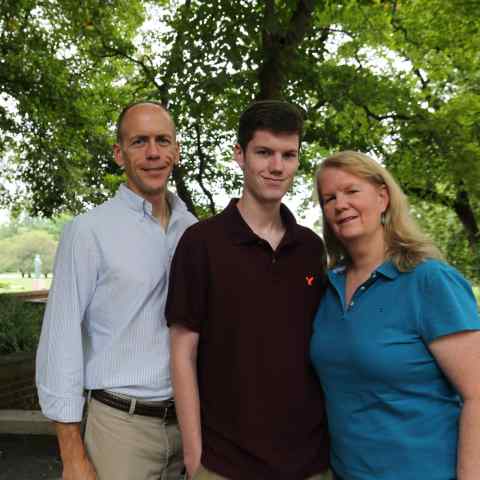
As the son of an Air Force officer, Spencer Mardis '18 has lived in three countries (Germany, Japan, and America) and studied in six different schools before heading for college. His area of interest is criminology, so he's considering a major in behavioral neuroscience and biology.
He was set to enroll at the University of Delaware until he and his parents had a chance encounter with Satyajit Dattagupta, vice president of enrollment management, on a snowy February Sunday morning while they were strolling the campus.
“He just dropped everything and spent several hours talking with us, showing us around the campus, telling us his story,” Chris Mardis says. “This tells us they do things differently here, and it's not just student-to-teacher ratios, it's the way they do everything. And since then that has been underscored and corroborated with every encounter we've had, whether it's the business office or the financial aid office.”
That same enthusiasm came through when the three of them sat in on a biology class with Aaron Krochmal, associate professor of biology.
“When we came out I said, ‘I want to be in that class!' ” says Emily Mardis, a speech pathologist. “What energy he had, what passion! What fun!”
Emily says it's easy to connect to people—students, faculty, and staff—on campus. “That's a lot of the magic.”
Spencer says although his parents attended larger universities as undergrads, he always preferred a smaller school, and Washington College was ideal. He's still contemplating what clubs to join as he decides on his major; right now, he's thinking about the College Democrats and the Psychology Club.
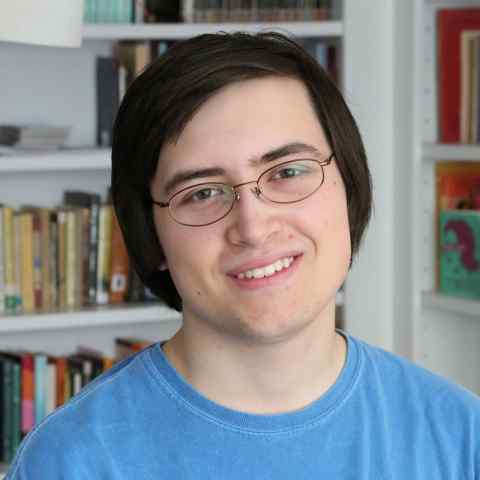
It's pretty clear that Ryan Manning '17 has a free-range kind of mind, one that's precise enough to AP test out of general chemistry and, at the same time, creative enough to love the beautiful challenge of writing poetry. These diverse interests and skills, and Washington College's Yellow Ribbon Program, are what drew him to Chestertown. And so far, he says, it's been everything he'd hoped.
“There are just so many opportunities for me here,” says Manning, who is a double major in English and chemistry with a minor in creative writing. “I really love how small Washington College is. I know that bothers some people, but I love it. I've had an excellent first two semesters.”
Manning comes from a military family. His father enlisted in the Navy, ultimately becoming a nuclear engineer and serving as a Navy submariner. Growing up in Georgia, Manning moved with his family to Howard County, Md., when his dad took a job at the Johns Hopkins Applied Physics Lab after leaving active service.
When the time came to look at colleges, he sought places that had strong programs in English and chemistry, and family friends suggested he add WC to his long list of schools. During his visits to the campus, he said, “every time I talked to any of the faculty members or the students, everyone I met was just fantastic. And over the summer I came out for a creative writing seminar at the Lit House with Jehanne Dubrow, and then first semester I had her as my creative writing professor. It's probably my favorite class I've ever taken in my whole educational career.”
Manning is spending his first college summer as an intern at the Rose O'Neill Literary House, where Dubrow is director, helping launch the Lit House's new publication, Cherry Tree. “We're learning how to use InDesign, the layout and publications program that professional designers use to make PDFs, books, magazines, etc.,” he says. “It's really interesting stuff, and we've been encouraged to work on our own independent projects in the program as we learn to use it. I'm loving it so far, and I'm excited to learn more about the publication we'll be working on.”
Manning says his father's veteran's benefits “are the only reasons I can even remotely consider coming here. He's been able to provide me with an opportunity I otherwise wouldn't have had.”
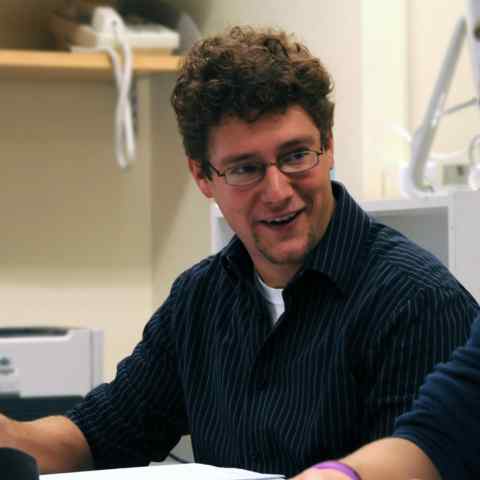
For the record, Joe Miloshevsky '15, really “despised”—his word— high school. So much so that he decided joining the Army to learn how to be a diesel mechanic would be his best choice for the future.
But it was during those six years and eight months spent as a diesel mechanic in the Army, based mainly in Germany but also through several deployments in Iraq, when the New Jersey native realized he wanted something more. When he returned to the States, he sought a college education, and through a series of events, he matriculated at Washington College as a sophomore.
“Washington College had a major in what I thought I wanted to do, which was a dual degree in engineering and physics,” Miloshevsky says. He enrolled in that major, then shifted to computer science with a minor in math as his focus changed. His transition back into the academic world was eased by attending Chesapeake College for a year, where he got most of his basic classes out of the way and regained an appreciation for school.
But he also says that Washington College has been extremely supportive as an institution as he has made his way here. “What I love about this school is the small class sizes. My computer science course I think we have seven students. It's lovely because it's so easy to communicate with the teacher.”
As a 29-year-old, he says it can be a little awkward in classes with students ten years younger. He's working with other student veterans to develop a club on campus for veterans, so that they could study together, share experiences, and support one another.
“Quite frankly, we're vets—we're designed to have camaraderie, and I think it would help us along a great deal to have a group,” he says.
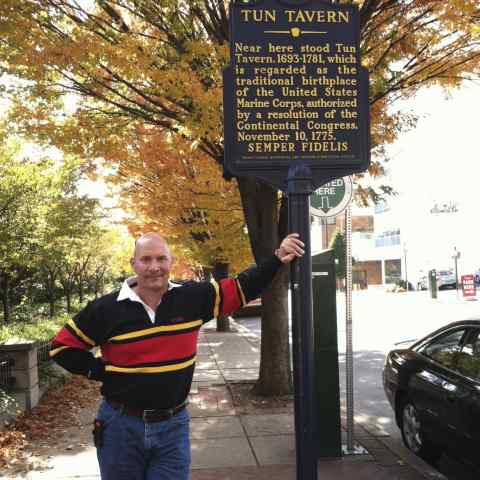
Jeffrey Harrington M '11 '14 has been around the world with the U.S. Marine Corps, but it's here in Chestertown where he is indulging one of his true passions—lifelong learning. Already a Washington College alum after earning his master's degree in history in 2011, Harrington is nearly finished his second master's, this one in psychology. And that doesn't include the EdD in education he already obtained while he was on active duty.
“I'm a big believer in education, and I didn't want to leave those benefits just sitting out there and not being used,” says Harrington. “This is really the first college experience I've had in 30 years, because I was always at a duty station and I'd try to go to night classes and put it together.”
Harrington spent 25 years with the Marines before retiring and settling in Chestertown in 2006. With his background in sociology and public administration, he served as everything from a paralegal to an embassy guard over the years. After retiring from the Corps, he took a job on Kent Island working for a defense contractor, providing computer-based training and education for the Corps' Center for Advanced Operational Cultural Learning.
After a bit he decided to use his Post 9/11 GI Bill benefit to enter the College's graduate program in history, “for the sake of learning.”
“A lot of people say it's a degree you can't do anything with, and I was one of the ones who said that,” he says. “But now I would disagree. It makes you a more well rounded person and it forces you to think outside the situation. It just gives you pause to look for more information.”
A member of Omicron Kappa Delta, the National Leadership Honor Society, Harrington says he feels that the WC's quiet nature and beautiful campus invites personal growth and reflection, helpful particularly to veterans. Still, he says, they have to immerse themselves to get the most out of the education.
“They're older and more mature and they sort of get it when I say, you get out of the place what you put into it. This place is not here to give you anything unless you're willing to take what it is they want to give you. You can come here with a chip on your shoulder that you have all this life experience, which is true, but there's so much more to learn.”
“The best investment you can make is in yourself,” Harrington says. “Even when I was a 29-year-old working on my undergrad with three kids, the most important thing was finishing, because it opened doors. You need a key to open the door, and this is where you get the key.”
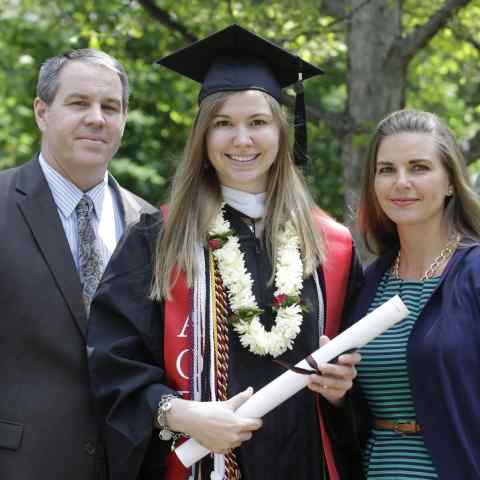
Emily Hoyle '14 had never visited Washington College until the week before her freshman year began and she arrived for the volleyball pre-season. That's because it's about 8,000 miles as the goose flies to Chestertown, Md., from Guam, where she attended high school.
“When I first came I was a little wary of how isolated it was,” Hoyle says. “Driving through all those cornfields the first time made me think, what did I do? But it ended up really well, and I probably wouldn't be going where I'm going and doing what I'm doing if I hadn't come here.”
Where the double major in political science and philosophy is going next is George Washington University Law School, on a full scholarship. Hoyle says the active engagement in her classes, “that dynamic of not just being talked to but having open discussions,” and the way in which she learned to think critically and analytically prepared her extremely well for the LSAT. “It's also a big part of law, analyzing everything, and it's also why I'm confident about pursuing that route. It's something I know I can be good at.”
This wasn't always the case, she says. The experiences she gained at Washington College, including internships with 1st District congressional candidate John LaFerla and a legislative internship with state Sen. Nancy King, helped hone her ambition to study law.
“Here, with so many opportunities thrown at me, I have become a lot more focused. I never thought I would go to law school when I was in high school, because I didn't feel like I was cut out for it. But here I realized that I could do it, and I wanted to, and I have much more concrete goals.”
So how did Hoyle end spending her teen years on a 200-square-mile island in the middle of the world's biggest ocean? Stationed in Guam, her father serves as a criminal investigator for the Coast Guard, working cases including environmental violations and human trafficking. His career has provoked her interest in the law, and it also funded her education at WC through his veteran's benefits and the Yellow Ribbon Program.
“I know I never would have been able to come here if I hadn't had it,” Hoyle says. “You don't make a lot of money being in the military, so I'm really thankful. And I think he's really happy, because he never really got an education other than what he's doing now, so he's really happy to see me have more opportunities.”
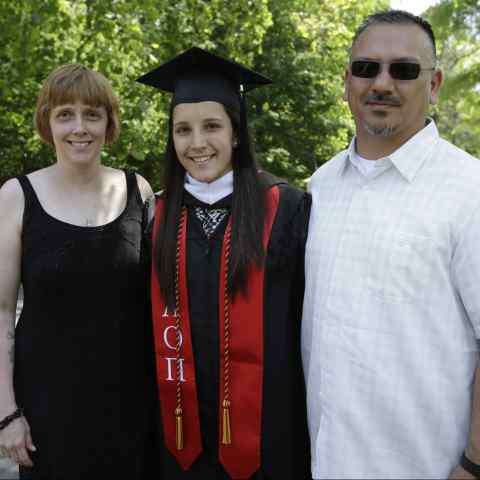
The military life runs like a deep river in Rachelle Martinez's family; her mother is an Army medic who has served in Iraq, and her father served in the infantry in the Gulf War, Iraq, and Afghanistan.
So a military school for college was the first choice for Martinez '14, until a blown knee and the surgery to repair it cost her that chance. It was her high school lacrosse coach, a Washington College alum, who suggested a different path. Amanda Arnoult '05 encouraged Martinez check out WC as she looked at larger schools as well.
“I came here with my best friend, did my tour, met the lacrosse coach, and I went home that night and I said, ‘I'm going to go there, Mom.' I fell in love with everything here.” Martinez majored in psychology, with minors in philosophy, and justice, law, and society. A lacrosse team goalie, she earned the 2012 most-improved player award after making her first career start against NCAA tournament team Montclair State and getting the win.
The College's contribution to the Yellow Ribbon Program was the key to Martinez being able to pursue her undergraduate education here, she says. As soon as Martinez came home announcing that Washington College was her first choice, her mother immediately started researching how to pay for it. “Because Washington College has a Yellow Ribbon Program we were able to do it,” she says.
After graduation, Martinez took over management at a Panera, a job that will help her fund graduate school to get her master's degree in clinical psychology.
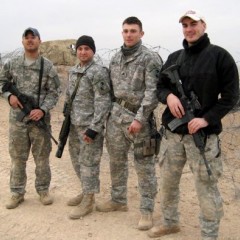
Oliver Barnyak '09 started his college career at WC in the fall of 2004 as an economics major, right after finishing up his basic training with the Army National Guard as a reconnaissance specialist. Then, in the fall of 2005, Hurricane Katrina slammed into the Gulf Coast, and the Guard called Barnyak up to go to New Orleans.
“The night before I left I got a phone call from [Washington College] President Tipson asking, ‘What do you need from us?' I had already talked with my professors and everything was cool. But that was kind of nice.”
He spent about a month in New Orleans, then returned to WC to continue pursuing his studies until the spring of his junior year, when he learned he was going to be deployed to Iraq in 2007-08—his entire senior year. After nine months overseas, he returned to WC in the fall of 2008 and graduated in spring 2009 with a degree in economics. In spring of 2014, he was accepted to the Geisel School of Medicine at Dartmouth College.
Always, he says, he had solid support from WC faculty and staff to make the transitions as painless as possible. The College's small community becomes a big benefit for veterans, he says. “You develop a rapport and relationship with your professors and staff, and after a while they know that you don't come bug them with small stuff and stupid stuff, and sometimes they drop what they're doing and help you out right away.”
There was no strong cohesion of veterans on the campus while he was in school, Barnyak says, but neither was there pressure to force his military experience to become part of his college experience. “Integrating them was something I wasn't interested in,” he says, “and it's nice that you have that choice.”
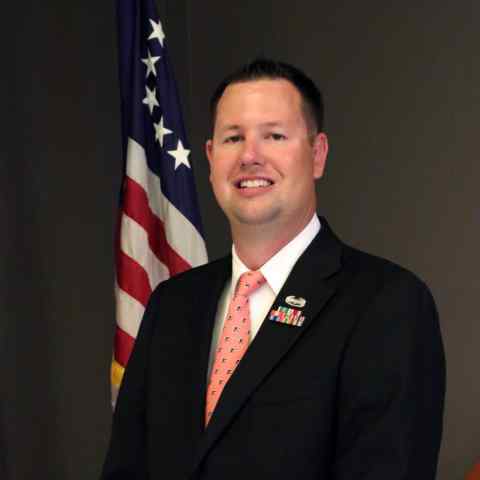
Vernon “Gene” Davis III started his Washington College career as a full-time employee after finishing his service with the Army. A patrol officer with Public Safety for seven years now, he hadn't really thought about pursuing a college degree until his boss, Director of Public Safety Jerry Roderick, and his wife encouraged him to consider it. After making the decision to matriculate, he met Associate Professor of Sociology Ryan Kelty, who has been his mentor through the entire process.
“They saw something in me that I didn't see in myself,” Davis says. “Now I'm aware of it. I didn't realize I could be a good student, and that means a lot to me.”
Davis, who grew up in the area, joined the Army, First Cavalry Division, after 9/11. He already had his truck driving certification, since before he joined up he drove the Kent County recycling truck. So he signed up with that skill, and before long found himself in Baghdad.
“My main mission was convoy security between southern Baghdad and the international airport. So some days I was on top of the truck as a gunner, sometimes I was shotgun, other times I was driving,” he says.
After a year in Iraq he was awarded the U.S. Army Combat Action Badge, and in May 2006 earned his honorable discharge. Two months later he started work on campus. “I took off one uniform and put another one on,” he says. “This is a good place to transition. You're around good people here, everybody around you inspires you to better yourself.”
Davis is majoring in American Studies, going to school part-time, since he has a full-time job and a family. He's also a certified self-defense instructor who teaches rape aggression self-defense classes on campus, as well as crime prevention instruction.
Davis has joined Kelty and fellow student-veteran Joe Miloshevsky in developing a veterans' club on campus. “The group is open to veterans and non-veterans,” he says. “Anybody who wants to support veterans can be part of it as well.”
Davis is also part of the 100 Faces of War Experience, an online exhibit of portraits and words of Americans who served in Iraq and Afghanistan.
The Yellow Ribbon Program
The Yellow Ribbon Program is a provision of the Post-9/11 Veterans Educational Assistance Act of 2008 (GI Bill®). Under this program, the act provides payment for tuition, fees, a stipend for books and supplies, and a housing allowance for qualified veterans who have served on active duty since September 11, 2001. Veterans who wish to be considered for this educational benefit must apply, qualify, and be approved by the Department of Veterans Affairs (DVA). Once approved, veterans may apply to transfer the benefit to qualified dependents.
The VA will determine eligibility for the Post-9/11 GI Bill® (Chapter 33), and issue a Certificate of Eligibility (COE) which will advise the student if he/she is eligible to participate in the Yellow Ribbon Program.
Washington College Yellow Ribbon is designed to cover the student's tuition and allowable fees above the annual maximum benefit established annually by the Department of Veteran's Affairs. After restricted institutional, state, federal and Post-9/11 GI Bill Benefits are applied, the student's remaining tuition and fees are covered one-half by Washington College and one-half by the Department of Veteran's Affairs.
Funds are applied to net tuition and fees in the following order:
- State and External Scholarships restricted for tuition only.
- Institutional aid restricted for tuition only.*
- Post-9/11 GI Bill® Benefits
- Washington College Yellow Ribbon Grant and VA matching funds
*At the time of acceptance, a Yellow Ribbon eligible student may be awarded a merit scholarship. Merit scholarships are applied to tuition and fees.
The combination of veteran's benefits, Yellow Ribbon funds and Washington College scholarships may not exceed the total cost of tuition and fees.
If a continuing student's Yellow Ribbon Benefits are exhausted, their previously awarded Washington College scholarships will be reinstated.
Eligible Majors
Not all majors at Washington College are eligible to receive Post-9/11 GI Bill benefits. Please see the link at the top of this page for a list of majors that are eligible to receive Post-9/11 GI Bill benefits.
Helpful Links
|
|